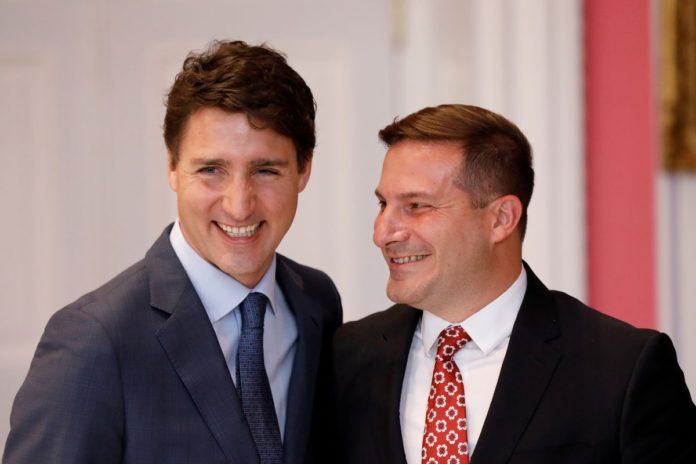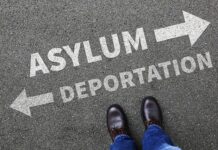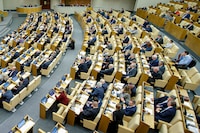/cloudfront-us-east-1.images.arcpublishing.com/tgam/ELJ5VO7IFRJTTOABPHDJTSWFC4.JPG)
arco Mendicino poses with Canada’s Prime Minister Justin Trudeau after being sworn-in as Minister of Immigration, Refugees and Citizenship during the presentation of Trudeau’s new cabinet on November 20, 2019.
BLAIR GABLE/Reuters
Advocacy groups are urging the federal government to exempt refugees from the pandemic travel ban as many are left waiting in limbo.
While Ottawa says it has continued to welcome the most vulnerable refugees since the onset of the pandemic, organizations that represent refugees and those who sponsor them, say many are left behind.
David Quan, a member of the Trinity-Grace United Church in Vancouver, said his church helped sponsor Alaa Salih, a gay Iraqi refugee living in Jordan, to come to Canada. Mr. Salih was on the cusp of having his paperwork finalized, Mr. Quan said, when the pandemic brought the application process to a standstill.
With church services moving online, Mr. Quan said, Mr. Salih has been joining the congregation every Sunday, including for a coffee afterwards.
“People in the congregation, and in the wider community, have been able to get to know him and it makes it even more heartbreaking because now you have the familiarity and the emotional attachment and so people really want to see him come to Canada,” he said.
Mr. Quan said he is concerned about Mr. Salih’s mental health, saying it’s hard being in limbo. He said there has not been much communication from the Immigration Department, and hopes that changes.
Mr. Salih told The Globe and Mail that he fled to Jordan in 2015 because he it was dangerous for him to stay in Iraq as a gay man. He said he was interviewed by officials at the Canadian embassy in Amman in February, 2020, and completed his medical exam. Since then, he has not heard anything about when his application will be finalized.
“It’s very difficult to be gay in [the] Middle East. I refused to live [a] double life, so that’s why I am struggling since 2015. I want to live my life out of the bubble,” he said in a message on WhatsApp.
Mr. Salih said no one in Jordan knows he is gay, but he is sharing his story because after waiting for years he feels he has “nothing to lose.”
Alex Cohen, a spokesperson for Immigration Minister Marco Mendicino, said last year Canada resettled more than 9,000 refugees, and continues to resettle urgent cases. As of mid-May, he said, Canada welcomed about 1,800 refugees and 15,000 protected persons – individuals who have reason to fear persecution in his or her country because of race, religion, nationality or political opinion.
“We want to be clear: Regardless of current circumstances, we will ensure that everyone approved to come to Canada will be able to do so,” he said.
Mr. Cohen said the government has taken steps to accommodate those in this situation, including extending the validity of medical results and having embassies and consulates arrange for refugees to redo their exams when an extension isn’t possible.
He said that because of Privacy Act provisions, Mr. Mendicino’s office cannot comment on specific cases without consent from the individuals, adding that in general, the government has continued to resettle urgent cases, with the UNHCR, the UN Refugee Agency, making that determination and referring cases.
Aleks Dughman-Manzur, programming director at advocacy group Rainbow Refugee, said there are many cases like Mr. Salih’s. After the onset of the pandemic, the government allowed people with a permanent resident visa issued before March 18 through its borders, but left those issued a visa afterward unable to enter.
“I have seen cases of people who were visa-ready on March 25,” said Mr. Dughman-Manzur. “And then you are stuck indefinitely, not knowing for how long. No one is able to provide you with any information, and you start also feeling the precarity of COVID.”
Mr. Dughman-Manzur said that the number of privately sponsored refugee cases in Canada’s backlog is over 50,000.
The Canadian Council for Refugees called on the government months ago to introduce exemptions to the travel measures for people being resettled as refugees and entering to make a refugee protection claim.
Janet Dench, the organization’s executive director, said refugee travel is essential, saying that those awaiting resettlement live in precarious circumstances and that the pandemic has only added to their vulnerability.
NDP immigration critic Jenny Kwan said processing delays were significant before the pandemic and “things have just gone from bad to worse.”
Ms. Kwan said the lag can be particularly burdensome for refugee families who left family members behind and made applications to reunite.
“I am regularly in discussion with people who made an application, been waiting a year, two years or more with having their application processed,” she said.
Our Morning Update and Evening Update newsletters are written by Globe editors, giving you a concise summary of the day’s most important headlines. Sign up today.







